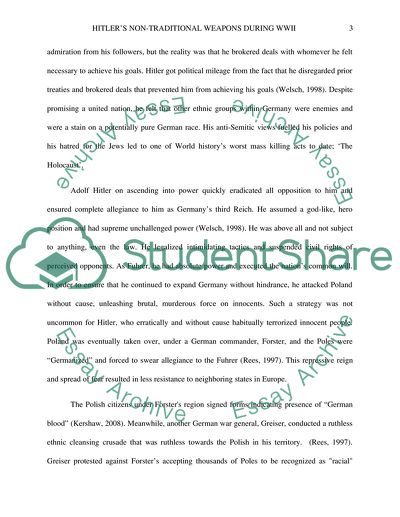Cite this document
(“Hitler's non-traditional weapons of Wold War 2. I.E. other than Guns, Term Paper”, n.d.)
Hitler's non-traditional weapons of Wold War 2. I.E. other than Guns, Term Paper. Retrieved from https://studentshare.org/history/1668334-hitlers-non-traditional-weapons-of-wold-war-2-ie-other-than-guns-planes-tanks-bombs-gas-and-rockets
Hitler's non-traditional weapons of Wold War 2. I.E. other than Guns, Term Paper. Retrieved from https://studentshare.org/history/1668334-hitlers-non-traditional-weapons-of-wold-war-2-ie-other-than-guns-planes-tanks-bombs-gas-and-rockets
(Hitler's Non-Traditional Weapons of Wold War 2. I.E. Other Than Guns, Term Paper)
Hitler's Non-Traditional Weapons of Wold War 2. I.E. Other Than Guns, Term Paper. https://studentshare.org/history/1668334-hitlers-non-traditional-weapons-of-wold-war-2-ie-other-than-guns-planes-tanks-bombs-gas-and-rockets.
Hitler's Non-Traditional Weapons of Wold War 2. I.E. Other Than Guns, Term Paper. https://studentshare.org/history/1668334-hitlers-non-traditional-weapons-of-wold-war-2-ie-other-than-guns-planes-tanks-bombs-gas-and-rockets.
“Hitler's Non-Traditional Weapons of Wold War 2. I.E. Other Than Guns, Term Paper”, n.d. https://studentshare.org/history/1668334-hitlers-non-traditional-weapons-of-wold-war-2-ie-other-than-guns-planes-tanks-bombs-gas-and-rockets.


